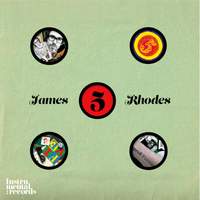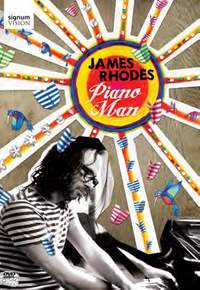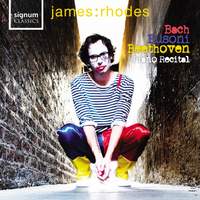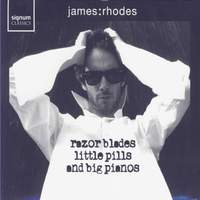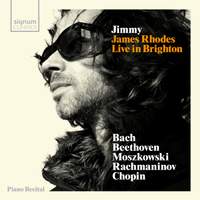Interview,
James Rhodes - Five
 Pianist James Rhodes has always taken the non-traditional route in performing and presenting classical music. His unorthodox stage manner, combined with consummate musicianship and a deep passion for music's ability to move people of all tastes and personalities, make him a unique and distinctive artist. I asked him about his latest album, entitled simply "Five", as well as about his other activities in bringing classical music to as wide an audience as possible.
Pianist James Rhodes has always taken the non-traditional route in performing and presenting classical music. His unorthodox stage manner, combined with consummate musicianship and a deep passion for music's ability to move people of all tastes and personalities, make him a unique and distinctive artist. I asked him about his latest album, entitled simply "Five", as well as about his other activities in bringing classical music to as wide an audience as possible.
The title of this album is a little enigmatic; five what? Is it simply a celebration of your fifth “birthday” as a recording artist (and fifth recital album), or do the five composers featured each have some significance to you as well?
Enigmatic?! As opposed to '100 Great Revision Classics', '50 Best Classical Hits EVER' etc etc? It is my fifth album, five years since my career started (when I met my manager Denis Blais). It's also a small nod to one of my idols Ben Folds Five. And a friend from China also assures me that 5 is one of the most virile numbers. I need some help in that area.
It’s perhaps a slightly unusual programme, with a Bach partita and a relatively unknown Beethoven sonata forming the backbone. Is there an underlying “theme” binding together the works you’ve chosen?
The only theme would be 'awesomeness'. C'mon - Bach, Beethoven, Chopin - it's a pretty standard mixed recital programme far as I'm concerned and also allows a broader mix of composers than a solo Chopin album, for example. And it breaks my heart that the Pastoral is seen as relatively unknown.
You’ve also got a new DVD out – “Piano Man”, and you’re also pretty active in television, documentaries and so on. This is quite unusual for a classical artists, but you’re evidently keen to “do your bit” to promote piano music to a wider audience than might otherwise encounter it. Do you see this sort of evangelism as part of your duty as a musician?
Not evangelism at all. I've felt for a long time that all musicians need to do their bit to open up music, start eliminating the separation of genres and start to communicate in a more diverse way - whether that's TV, social media, soundcloud or albums and touring. Hence releasing this on my own record label - suddenly now I have an opportunity to sign new artists, tour as a label, engage audiences from the stage and so on. If a few hundred thousand people get to listen to some Rachmaninov, Gluck or Schubert because I'm on the telly then that makes me stupidly happy.
Your 2013 documentary “Notes from the Inside” takes quite a bold, and indeed a quite personal, approach to the very sensitive subject of mental health. Did you encounter any opposition when you were trying to sell the idea of making this programme?
There was no sell involved - Channel 4 and I agreed on the topic easily and quickly. Mental health isn't one of the 'glamourous' topics as far as illness is concerned and it's quite a gritty topic. I'm dead grateful that C4 continue to do their bit to talk about it. Especially when most musicians seem to have various mental health issues of their own...
Do you feel your non-traditional image, compared to the majority of today’s classical musicians, has been more of a help or a hindrance in your performing career?
If you define a 'traditional image' as 'creative, introverted asshole shrouded in his own genius' then it's been a help, certainly on a personal level. Certainly I've been lucky enough to sell a few tickets, have an average audience age in their 20's and get many newcomers through the doors to listen to Chopin, Bach and Beethoven etc. I'd hope anyone interested in music-making would see that as a help. Truth is my image (ugh what a horrible word) is just me. I'm the same on stage as off and don't see why I'd want to change that. It always alarms me when people make such a big deal over what I wear and that I talk from the stage in between pieces. Surely there are more important things to talk about…
FIVE is out now on Signum; the programme consists of JS Bach's Partita No. 1 in B flat BWV825, Beethoven's Pastoral Sonata, Chopin Ballade No. 3 Op. 47 and Scherzo No. 2 Op. 31, Liszt/Schumann's Frühlingsnacht, and Sgambati's transcription of a melody from Gluck's Orfeo.
Available Formats: CD, MP3, FLAC, Hi-Res FLAC
Other recordings by James Rhodes
In this recital-cum-documentary, James draws on his personal experiences to explore the lives of some troubled composers through certain pieces that have special significance to him." The repertoire ranges from familiar favourites such as Debussy's Claire de Lune and Grieg's In the Hall of the Mountain King to the less well-known Etincelles of Moszkowski.
Available Format: DVD Video
James describes this album in part as a celebration of what he calls the 'blessing' of never having taken part in formalised piano studies - enabling him to pick and choose his repertoire based solely on his own reaction to the music.
Available Formats: 2 CDs, MP3, FLAC
James' debut album - setting out his stall as a mould-breaking musician while not afraid to acknowledge, and draw on, his troubled past - instantly established his reputation as a pianist to be reckoned with. It's an emotive and deeply personal recital.
Available Formats: CD, MP3, FLAC
A live recital dominated by transcriptions - including Balakirev's solo version of the Romance from Chopin's 1st Piano Concerto. James' inimitable stage presence is to the fore here, and his engaging discussions of the works he has chosen are as fascinating as the performances themselves.
Available Formats: 2 CDs, MP3, FLAC


